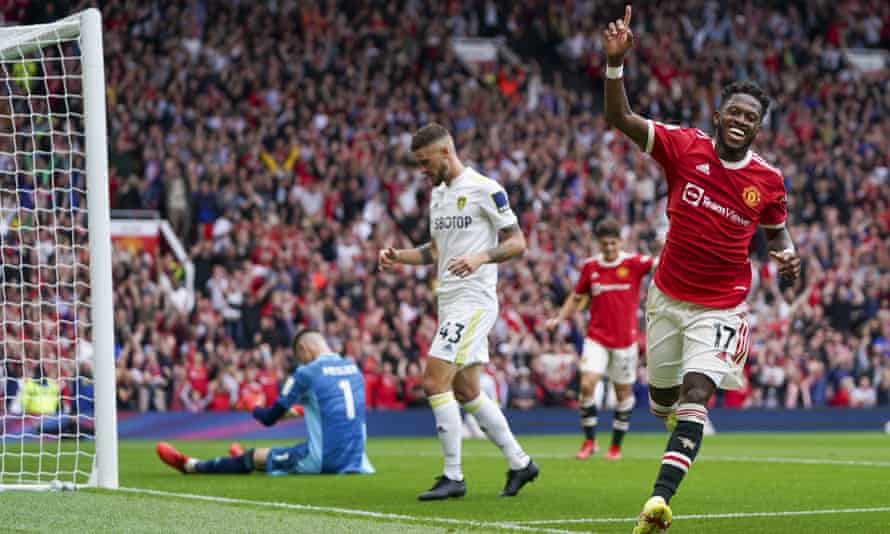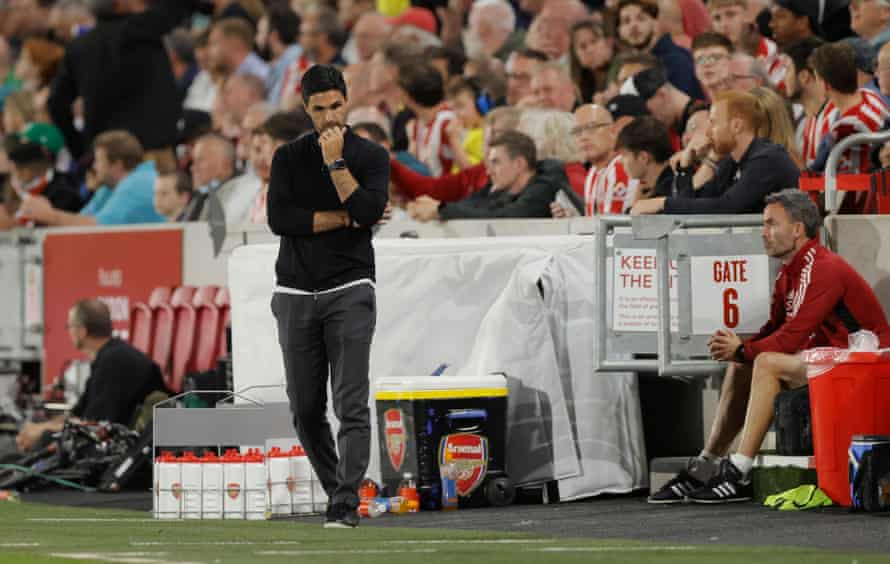
Manchester United’s Fred celebrates celebrates after completing Manchester United’s 5-1 victory over Leeds. Photograph: Jon Super/AP
Jonathan Wilson in The Guardian
Jonathan Wilson in The Guardian
The easy thing is to blame the manager. It has become football’s default response to any crisis. A team hits a poor run or loses a big game: get rid of the manager. As Alex Ferguson said as many as 14 years ago, we live in “a mocking culture” and reality television has fostered the idea people should be voted off with great regularity (that he was trying to defend Steve McClaren’s reign as England manager should not undermine the wider point).
Managers are expendable. Rejigging squads takes time and money and huge amounts of effort in terms of research and recruitment, whereas anybody can look at who is doing well in Portugal or Greece or the Championship and spy a potential messiah. Then there are the structural factors, the underlying economic issues it is often preferable to ignore because to acknowledge them is to accept how little agency the people we shout about every week really have in football.
That point reared its head after Manchester United’s 5-1 victory over Leeds on Saturday. There was plenty to discuss: are Leeds overreliant on Kalvin Phillips, who was absent? Why does Marcelo Bielsa’s version of pressing so often lead to heavy defeats? Can Mason Greenwood’s movement allow Ole Gunnar Solskjær to field Paul Pogba and Bruno Fernandes without sacrificing a holding midfielder and, if it does, what does that mean for Marcus Rashford?
Yet there was a weird strand of coverage that insisted Solskjær had somehow outwitted Bielsa, even in some quarters that Bielsa needed to be replaced if Leeds are to kick on. (They finished ninth last season with 59 points, the highest points total by a promoted club for two decades). A Bielsa meltdown is possible; they do happen and he has never managed a fourth season at a club. There should be some concern that, like last season, Leeds lost by four goals at Old Trafford, insufficient lessons were learned, even if Bielsa said this was a better performance. But fundamentally, Manchester United’s wage bill is five times that of Leeds.
Everton, who finished a place below Leeds last season, had a wage bill three times bigger. Of last season’s Premier League, only West Brom and Sheffield United had wage bills lower than that of Leeds. To have finished ninth is an extraordinary achievement and nobody should think to slip back three or four places this season would be a failure. Modern football is starkly stratified and although teams can often defy financial logic for a time, to move up a tier is incredibly difficult.
There is still a tendency to talk of a Big Six in English football and while it is true six clubs last season had a weekly wage bill in excess of £2.5m, it is also true that within that grouping there are three with clear advantages: Manchester City (who had kept their wage bill relatively low, although if they do add Harry Kane to Jack Grealish that would clearly change) and Chelsea because their funding is not reliant on footballing success, and Manchester United because of the legacy that has allowed them to attach their name to a preposterous range of products across the globe.
 Mikel Arteta is struggling to revive Arsenal. Photograph: Tom Jenkins/The Guardian
Mikel Arteta is struggling to revive Arsenal. Photograph: Tom Jenkins/The GuardianLiverpool can perhaps challenge for the title this season, but their wage spending is 74% of that of United. That they were as good as they were in the two seasons before last was remarkable, but last season showed how vulnerable a team like Liverpool can be to a couple of injuries. Similarly, Leicester’s two fifth-place finishes with the eighth-highest wage bill are a striking achievement, their decline towards the end of the past two seasons less the result of them bottling it or any sort of psychological failure than of the limitations of their squad being exposed.
Which brings us to the other two members of the Big Six: Arsenal and Tottenham. Spurs’ last game at White Hart Lane, in 2017, brought a 2-1 win over Manchester United that guaranteed they finished second. Since when Spurs have bought Davinson Sánchez, Lucas Moura, Serge Aurier, Fernando Llorente, Juan Foyth, Tanguy Ndombele, Steven Bergwijn, Ryan Sessegnon, Giovani Lo Celso, Cristian Romero and Bryan Gil, while United have bought, among others, Alexis Sánchez, Victor Lindelöf, Nemanja Matic, Romelu Lukaku, Fred, Daniel James, Aaron Wan-Bissaka, Bruno Fernandes, Harry Maguire, Donny van de Beek, Raphaël Varane and Jadon Sancho. Money may not be everything in football, but it does help.
The irony of the situation is that it was investment in the infrastructure that should allow Spurs to generate additional revenues and better develop their own talent (much cheaper than buying it) that led to the lack of investment in players largely responsible for the staleness resulting in Mauricio Pochettino’s departure. That Daniel Levy compounded the problem by appointing José Mourinho – acting like a big club as though to jolt them to the next level – should not obscure the fact that until that point he had pursued a ruthless and successful economic logic.
Arsenal had gone through a similar process the previous decade, investing heavily in a new stadium at the expense of the squad, only to discover that by the time it was ready the financial environment had changed and the petro-fuelled era had begun. It was easy after the timid performance against Brentford on Friday to blame Mikel Arteta and ask why he gets such an easy ride. For all that Arsenal have finished the past two seasons relatively well, that criticism will only increase if there are not signs the tanker is being turned round. But the gulf to the top of the table is vast and a desperation to bridge that has contributed to a bizarre transfer policy.
That does not mean managers are beyond reproach and limp displays like Arsenal’s deserve criticism. But equally we should probably remember that where a side finishes in the league has far more to do with economic strata than any of the individuals involved.
